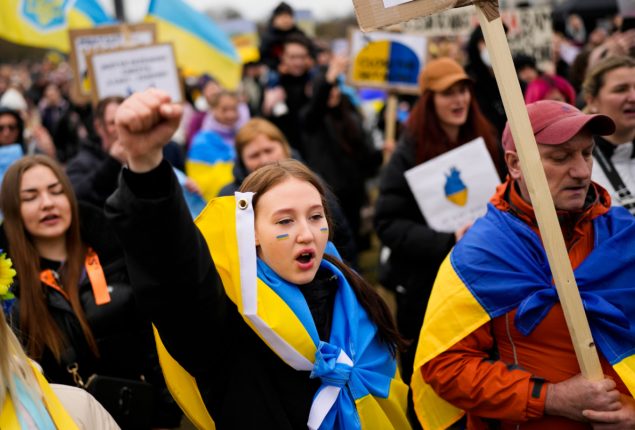U.S drone sale to Ukraine encounters difficulty
the Biden administration's proposal to send four sizable, armed drones to Ukraine ...

EU counters anti-Ukraine propaganda ahead of vote
As the European parliamentary elections in June approaches, experts caution that pro-Russian players are saturating social media with false claims about the war in Ukraine to bolster support for far-right and nationalist parties.
Pro-Russian accounts on Facebook, X, and TikTok have been disseminating posts that depict Ukrainian refugees as violent criminals or allege that Kyiv’s government officials embezzle financial aid sent by the West to purchase luxury yachts and villas for themselves.
Another theme with particular potency in countries closest to the conflict is the assertion that refugees receive higher state benefits than locals.
Jakub Kalensky, an analyst at the European Center of Excellence for Countering Hybrid Threats (Hybrid CoE) in Helsinki, Finland, stated that such propaganda aims to weaken the EU’s resolve and benefit anti-immigration parties like Germany’s AfD, France’s National Rally, or the Party for Freedom in the Netherlands.
He emphasized that such disinformation will “definitely play a role” in the June 6-9 vote, during which more than 400 million Europeans will choose a new five-year parliament.
“When you exaggerate the risk of Ukrainian immigrants, you boost anti-immigration parties,” Kalensky said.
“I’m convinced that if it weren’t for the Russian propaganda, movements led by leaders like Marine Le Pen (in France), Geert Wilders (in the Netherlands), or Robert Fico (in Slovakia) would have significantly lower election results.”
Dietmar Pichler, a disinformation analyst at the Center for Digital Media Literacy in Vienna, Austria, anticipates an intensification of anti-Ukraine disinformation ahead of the June vote as Russia seeks to promote Kremlin-friendly European parties.
He has identified two main topics that have already emerged in EU campaigns — the sanctions against Russia and financial aid to Ukraine.
“Actors aiming to halt this support for Ukraine are employing disinformation and Russian propaganda narratives to ‘justify’ this anti-Ukrainian position,” Pichler told the news.
But according to the analyst, pro-Russian narratives also influence the policies of mainstream parties, occasionally silencing those who might otherwise lend their support to Ukraine.
“Some politicians are now afraid to address topics like Ukraine or Russia altogether because they fear attacks by Russian trolls, bots, and pro-Russian actors on the domestic level,” he said.
According to Kalensky, the pro-Kremlin disinformation campaign may encounter particularly fertile ground in countries such as Hungary and Slovakia, where governments actively stoke anti-immigration sentiment and advocate for Brussels to reconcile with Russia.
On the second anniversary of the Russian invasion on February 24, Slovak premier Fico — who has repeatedly likened Ukrainians to Nazis, echoing Moscow’s justification for the assault — accused the EU of “hating the Russian Federation” and urged it to “come up with a peace plan for both countries.”
Hungarian state media frequently suggest that the Ukraine conflict could lead to World War III or propagate unsubstantiated claims about the forcible recruitment of Ukrainian men for the battlefield.
Even Kyiv’s staunchest allies, such as Poland, are not immune to the propaganda flooding the Internet since Russia invaded Ukraine in February 2022.
Angry Polish farmers have protested about cheaper Ukrainian grain imports, and claims abound on Polish social media that refugees flood the labor markets, undercut wages, or receive welfare payouts that locals can only dream about.
“The message is ‘this is the Ukrainian gratitude for your help’, ‘they are using us’ and ‘they don’t respect us’,” said Andrzej Kozlowski, cybersecurity and disinformation expert at the Casimir Pulaski Foundation in Warsaw, Poland.
Catch all the International News, Breaking News Event and Latest News Updates on The BOL News
Download The BOL News App to get the Daily News Update & Follow us on Google News.